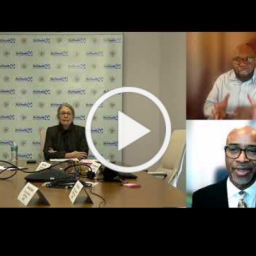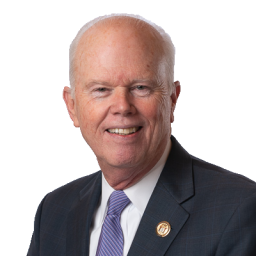Trenton – In a major bipartisan effort, the Senate overwhelmingly cleared 27 bills today that will help the state address the COVID-19 crisis now, and in the months ahead.
“This is an international health care crisis that will have consequences that extend to many other aspects of our lives in New Jersey. The immediate threat is to the health and safety of residents in communities throughout the state, but it also threatens to have an impact on everything from education, medical care, public services, jobs, the economy and the finances of individuals and families. This is a time when government is needed more than ever,” said Senate President Steve Sweeney (D-Gloucester/Salem/Cumberland). “We won’t be able to solve it overnight and we can’t prevent all the negative effects from happening, but there are actions we can take to contain the spread of the virus, to care for those who become infected and to help those who are impacted. These bills will help.”
“Our society is facing an unprecedented challenge from COVID-19 that requires a coordinated response by all levels and branches of government,” said Senate Republican Leader Tom Kean (R-Morris/Somerset/Union). “Republicans and Democrats in both houses of the New Jersey Legislature are working together to advance legislation that is critical to the well-being of the Garden State. The critical measures we advanced today will help governments and schools to continue serving people and support the many needs of families and employers during this difficult time. As more concerns are identified, we will continue to address them together.”
“Today’s action by the Senate is a powerful message to the people of New Jersey. It says that together we are going to take care of our sick, feed and help house our underserved communities, support our workers and our businesses and release the funds needed to take swift and determined action to protect New Jerseyans,” said Senate Joseph Vitale, the Chair of the Senate Health, Human Services and Senior Citizens Committee. “This pandemic is unprecedented and is far above partisan politics. The legislation we passed shows that the state’s legislature understands that we are all in this together and it is our collective action that will ultimately determine the severity of the impact this public health emergency will have on the State of New Jersey and on the nation.”
“I am proud of the work we are doing to ensure a global approach to the public health crisis we are facing. It is important we are taking into account both the short term and long term impact, while remaining flexible enough to address the challenges that continue to arise,” said Senate President Pro Tempore M. Teresa Ruiz (D-Essex). “Whether it be planning how to distribute meals to school children, addressing the digital divide or safeguarding our small businesses, every step of the way we are learning to better care for the people of New Jersey going forward.”
“The news surrounding the coronavirus can be quite scary and the actions that are being taken around the state to mitigate its spread can also create a lot of anxiety. Closing down schools, moratoriums on large crowds, isolation and quarantines are all part of mitigation to slow the spread of the virus and contain it,” said Senator Joseph Cryan (D-Union). “These decisions are made to get ahead of the escalation of the virus and to protect the health and safety of everyone. We also have to act to help those who are most vulnerable to the financial consequences and who work paycheck to paycheck to put food on the table and keep a roof over their heads. We can’t allow people to be evicted from their homes or to go hungry as a result of the effects of this crisis. These are actions we can take to protect against the hardships they may face.”
“With each passing day, we are seeing more evidence of the catastrophic harm the coronavirus is doing to our economy and our daily lives. The pandemic has become one of the defining moments of our lifetime,” said Senator Anthony M. Bucco (R-Morris/Somerset). “Now, more than ever, our State and Nation depend on bipartisan leadership. This is clearly evident today as I join with my colleagues on both sides of the aisle in support of almost 30 urgently needed bills that will help individuals, families, employers, and local and county governments deal with the unknown consequences of COVID-19. In true bipartisan fashion, I am proud to sponsor some of these critical measures and appreciate the Legislature’s quick response for the sake of New Jersey residents. We will continue to monitor this ever-evolving situation and make further corrections where necessary.”
In order to address the needs of New Jersey residents during and following the Coronavirus public health emergency, the Senate cleared the following bills:
The bill, S-2304, sponsored by Senator Sweeney, would provide that an employee is eligible for earned sick leave, family temporary disability leave, temporary disability leave or family leave, as appropriate, if they are unable to work during a state of emergency because a physician or public health authority has determined they should quarantine to protect the health of others.
The bill, A-3095/S-1982, sponsored by Senators Beach and Turner, would give county clerks an extra week to proof, print, prepare and send mail-in ballots to voters. The bill would help county clerks handle the significant number of mail-in ballots that are expected to be used during the 2020 primary election.
The bill, A-3813/S-2292, sponsored by Senators Cardinale, Beach and Kean, would allow remote learning to apply to the 180-day instruction requirement for school districts during extended emergency school closures. This bill would apply for both a declared state of emergency and a public health emergency.
The bill, A-3840/S-2281, sponsored by Senators Ruiz and Cunningham, would require school districts to provide meals to students enrolled in the free or reduced meal program during COVID-19 school closings. The bill provides direction as to how schools may distribute meals or meal vouchers.
The bill, A-3841/S-2300, sponsored by Senators Diegnan and Sarlo, would automatically extend the deadline to file a gross income tax or corporation business tax return if the federal government extends the filing or payment due date for federal returns.
The bill, A-3842/S-2282, sponsored by Senators Ruiz, Kean and Rice, would allocate funds to expand access to laptops, tablets, hot spot devices and other technology for students to use at home or at school. This bill would address the digital divide and ensure students have the technology they need for remote instruction.
The bill, A-3843/S-2283, sponsored by Senators Vitale, Lagana and Pou, would require health insurance and Medicaid to cover testing for COVID-19, telehealth and telemedicine services, without cost-sharing requirements, during the state of emergency.
The bill, A-3845/S-2284, sponsored by Senators Cruz-Perez, Stack, Kean and Bucco, would authorize the New Jersey Economic Development Authority to provide grants during periods of emergency declared by the Governor, such as the coronavirus, and for the duration of the economic disruptions caused by the emergency.
The bill, A-3846/S-2293, sponsored by Senators Madden and Lagana, would create the “Temporary Lost Wage Unemployment Program” to allow those affected by coronavirus to recoup wages lost and to assist employers who pay wages to workers under quarantine. The bill appropriates $20 million for the program.
The bill, A-3848/S-2301, sponsored by Senator Weinberg, would prohibit an employer from terminating, or refusing to reinstate, an employee who takes time off from work at the recommendation of a medical professional due to an infectious disease.
The bill, A-3849/S-2302, sponsored by Senators Bucco and Cruz-Perez, would allow a flexible deadline for OPRA requests during a statewide or local emergency. In those instances, the bill would require a reasonable effort be made to respond in seven business days, or as soon as possible thereafter.
A bill, A-3850/S-2294, sponsored by Senators Beach and Bucco, would allow a public body to conduct meetings electronically during a statewide or local emergency. Under the bill, public business conducted electronically should be limited to matters necessary for the continuing operation of government or related to the applicable declarations of emergency.
A bill, A-3851/S-2295, sponsored Senators Bucco and Gopal, would permit the extension of deadlines for adopting county and municipal budgets when the Governor has declared a public health emergency, a state of emergency or both.
The bill, A-3852/S-2296, Senators Sweeney and Kean, would allow the conduct of state business and legislative sessions at locations other than Trenton during periods of emergency, as determined by the Governor or the Legislature. Under the bill, the legislature would be able to use available technology to conduct business and comply with the requirements of the New Jersey Constitution.
The bill, A-3854/S-2286, sponsored by Senators Vitale and Gill, would authorize all licensed health care facilities and clinical laboratories to collect specimens to test for COVID-19 for the duration of the public health emergency.
The bill, A-3855/S-2287, sponsored by Senators Kean and Codey, would require the statewide 2-1-1 system and all executive branch departments to prominently display information concerning food access programs and resources through their websites and social media for the duration of any declared public health emergency.
The bill, A-3856/S-2297, sponsored by Senator Gopal, would appropriate $10 million for health care and residential facility sanitation due to the COVID-19 outbreak. Eligible facilities would include nursing homes, senior centers, long-term care facilities and homeless shelters, among others.
The bill, A-3857/S-2275, sponsored by Senator Cryan, would appropriate $15 million for grants to the Community Food Bank of New Jersey, the Food Bank of South Jersey and Fulfill Monmouth and Ocean to provide assistance to families in need.
The bill, A-3858/S-2288, sponsored by Senators Greenstein and Vitale, would direct the Commissioner of Human Services to issue supplemental cash assistance payments to eligible recipients of the Work First New Jersey Program, in addition to their standard benefits, during a public health emergency in which it is determined the standard benefits are insufficient to support the needs of recipients.
The bill, A-3859/S-2276, sponsored by Senators Cryan and Pou, would allow the Governor to issue an executive order to prohibit residential tenant evictions and foreclosure evictions during a public health emergency or state of emergency.
The bill, A-3860/S-2289, sponsored by Senator Vitale, would authorize any health care practitioner to provide and bill for services using telemedicine and telehealth during the COVID-19 public health emergency.
The bill, A-3861/S-2290, sponsored by Senator Diegnan, would permit corporations to hold shareholder meetings in part or solely by means of remote communications during a state of emergency.
The bill, A-3862/S-2298, sponsored by Senators Pou and Kean, would allow professional or occupational licensing boards to grant licenses, certificates of registration and certifications on an expedited basis to individuals who hold a corresponding credential, in good standing, in another state, during a state of emergency or a public health emergency.
The bill, A-3864/S-2299, sponsored by Senator Greenstein, would allow notaries public to perform certain notarial acts remotely, using communication technology.
The bill, A-3865/S-2291, sponsored by Senator Addiego, would prohibit retail food stores from accepting the return of any groceries and other food products purchased during, and for 30 days following, a state of emergency declared in response to COVID-19.
The concurrent resolution, ACR-165/SCR-109, sponsored by Senators Vitale and Pou, would urge the Department of Human Services to apply for any federal waivers available to facilitate and increase access to SNAP benefits during the COVID-19 outbreak.
The joint resolution, AJR-158/SJR-77, sponsored by Senator Cruz-Perez, urges the Federal Communications Commission to take temporary measures to secure broadband access for those affected by the COVID-19 public health emergency.




